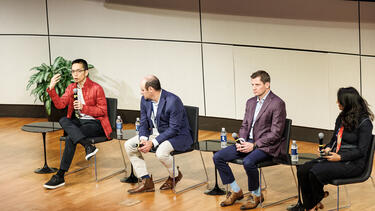Data and AI
Our Most-Read Stories of 2025
This year, our faculty and alumni provided expertise on pressing issues including political polarization, sports gambling, tariffs, public education, the business of the arts, and the seismic impact of AI.

What Does Responsible AI Look Like?
Business leaders discussed how companies can reinvent themselves to succeed in the evolving AI economy as part of a student-led conference at Yale SOM.

When AI Is the Editor, Consumer Complaints Are More Likely to Succeed
An analysis of complaints submitted to the Consumer Financial Protection Bureau reveals that consumers are using tools like ChatGPT to help them articulate their concerns. Those AI-edited grievances have a higher likelihood of receiving relief, according to new research co-authored by Yale SOM’s Jiwoong Shin.

Who Will Finance the AI Revolution?
Deployment of AI is accelerating exponentially, and the nascent industry requires unprecedented investment to grow. We spoke to two Yale College alums and leaders at Goldman Sachs about where the capital to support an AI transition is coming from.

The Right Approach to State Regulation of AI
Yale SOM’s Jeffrey Sonnenfeld and co-author Stephen Henriques write that Connecticut should begin by applying its existing consumer protection, civil rights, and data protection laws to artificial intelligence, rather than scrambling to create new laws that could hamper innovation in the state.

Our Most-Read Stories of 2024
This year, faculty and alumni experts helped us understand issues including the expanding role of AI in our society, the new space economy, the impact of gender in the workplace, the keys to financing a greener economy, and the psychological quirks that lead us toward irrational economic choices.

Who Is Responsible When AI Breaks the Law?
Former Secretary of Homeland Security Michael Chertoff and Miriam Vogel, president and CEO of EqualAI, survey how AI both fits in and breaks existing legal frameworks. They argue that leaders need to be ready for the opportunities created by the novel technology and for potential legal pitfalls.

How AI Is Already Transforming Fortune 500 Businesses, According to Their CEOs
At a recent Yale CEO Summit, Prof. Jeffrey Sonnenfeld talked to business leaders about the AI tools and other new technologies appearing everywhere from back offices to fast-food kitchens. Sonnenfeld and co-author Steven Tian outline the looming changes in a variety of sectors.

AI Can Write a More Believable Restaurant Review Than a Human Can
Yale SOM’s Balázs Kovács used ChatGPT to write a series of Yelp-style reviews, as well as collecting real reviews from the site, and then asked human subjects to decide which was the real thing. They were more convinced of the authenticity of the AI-written reviews.

- Collection No. 8
Are You Ready for AI?
Of the many technologies that have changed our lives since the invention of the microchip, generative AI may have had the most dramatic debut. ChatGPT is likely the fastest-growing internet service ever, and every major tech company is scrambling to incorporate Large Language Models into their products. We’ve been talking with Yale faculty and alumni about the potential of the technology to both advance and disrupt our society.

What Have the Bots Learned about Us?
The emergence of generative AI has opened new possibilities for the mass creation and dissemination of misinformation. Are the major social media platforms ready? We talked to Prof. Tauhid Zaman, who studies how bots manipulate opinion on social networks.
